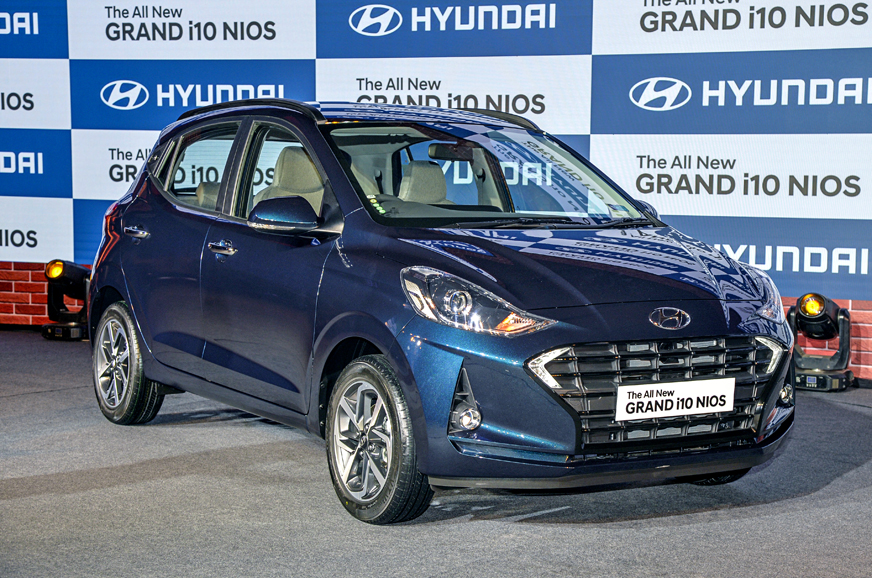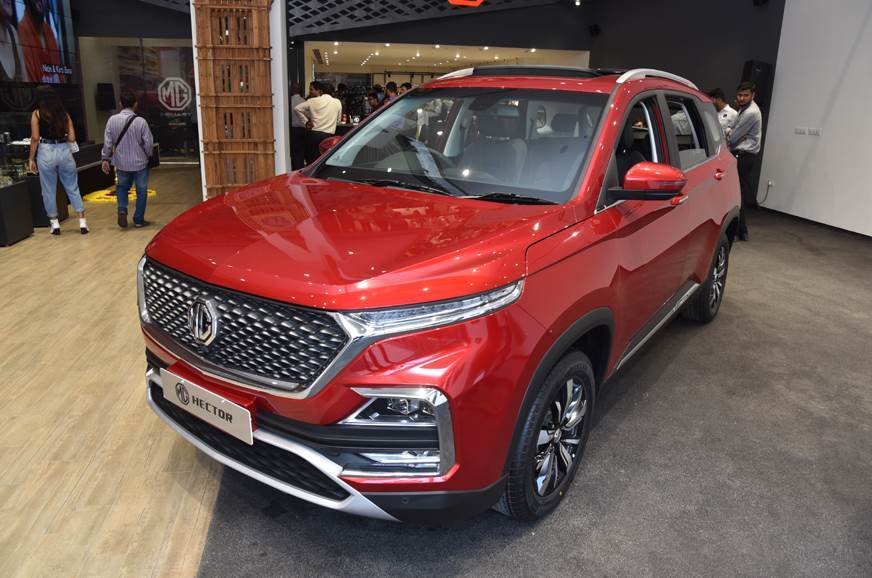
The Hyundai Grand i10 Nios has just been launched in our market, with prices ranging between Rs 4.99-7.99 lakh. In terms of positioning, the new Grand i10 Nios will co-exist with the current-gen Grand i10 and will slot in between the Grand i10 and i20 in Hyundai's India line-up. As the Grand i10 Nios’ price point, size and features list is at a slightly higher level than the Grand i10’s, the new Hyundai hatchback will go up against the same rivals in our market.
We compare the new Hyundai Grand i10 Nios to the Grand i10, Maruti Suzuki Swift, Ford Figo and Volkswagen Polo, on price and fuel efficiency, to find out how well it matches up.
Engine, gearbox and mileage per litre
Ford’s Figo definitely has the advantage in terms of petrol powertrains – its 1.2-litre and 1.5-litre engines may be down a cylinder compared to the others, but it has the highest output figures by far. The Ford is also the only model here to come with a torque convertor automatic; the new Hyundai and the Marutis get a 5-speed AMT option. For now, the Swift and the Grand i10 Nios are the only models to get a BS6-compliant petrol motor, though Maruti’s upgraded K12B mill from the Swift will be introduced on the Ignis soon.
What we can see here is that the Maruti Suzuki Swift is still the most fuel-efficient hatchback in the segment, returning 21.21kpl. It is followed by its premium stablemate, the Ignis, which delivers 20.89kpl. The new Hyundai Grand i10 Nios secures third place, with 20.7kpl for the manual and 20.5kpl for the AMT. This means it improves on the current Grand i10’s figures, despite being BS6 compliant, which is interesting considering Maruti Suzuki’s BS6-compliant K12B motor is slightly less efficient than the BS4 version. The Ford Figo comes in fourth, as its efficiency is rated at 20.4kpl (manual) and 16.3kpl (auto). The current Hyundai Grand i10 petrol comes in last, with a fuel efficiency figure of 19.77kpl.
NOTE - The petrol-auto combo of the old Grand i10, which has been discontinued, was rated at 17.49kpl.
| Hyundai Grand i10 Nios vs rivals: Petrol engines | |||||
| Grand i10 Nios | Grand i10 | Swift | Figo | Ignis | |
| Displacement | 1.2-litre | 1.2-litre | 1.2-litre | 1.2-litre/1.5-litre | 1.2-litre |
| Engine type | 4 cyl | 4 cyl | 4 cyl | 3 cyl/3 cyl | 4 cyl |
| Power | 83hp | 83hp | 83hp | 96hp/123hp | 83hp |
| Torque | 114Nm | 114Nm | 113Nm | 120Nm/150Nm | 113Nm |
| Gearbox | 5-speed MT & AMT | 5-speed MT | 5-speed MT & AMT | 5-speed MT/6-speed torque converter | 5-speed MT & AMT |
| Emission standard | BS6 | BS4 | BS6 | BS4 | BS4 |
| Fuel efficiency (MT) | 20.7kpl | 19.77kpl | 21.21kpl | 20.4kpl | 20.89kpl |
| Fuel efficiency (AT) | 20.5kpl | - | 21.21kpl | 16.3kpl | 20.89kpl |
Coming to the diesel engines, only the Hyundai Grand i10 Nios, Maruti Suzuki Swift and the Ford Figo are offered with diesel units. The Figo’s is the largest and most powerful but it is also the least efficient out of the lot; it also misses out on a diesel-automatic option. As expected, it is the Swift that has the most efficient unit with a rating of 28.4kpl in both manual and AMT form. The Grand i10 Nios comes in next, with its diesel engine returning 26.2kpl in both, manual and AMT forms. It is worth noting that all the diesel engines are only BS4-compliant, though Hyundai has confirmed that its U2 1.2-litre motor will be upgraded to BS6 form by February next year.
NOTE - The now-defunct diesel variant of the last-gen Grand i10 had an ARAI rated mileage of 24.95kpl.
| Hyundai Grand i10 Nios vs rivals: Diesel engines | |||||
| Grand i10 Nios | Grand i10 | Swift | Figo | Ignis | |
| Displacement | 1.2-litre | - | 1.3-litre | 1.5-litre | - |
| Engine type | 3-cyl, turbocharged | - | 4-cyl, turbocharged | 4-cyl, turbocharged | - |
| Power | 75hp | - | 75hp | 100hp | - |
| Torque | 190Nm | - | 190Nm | 215Nm | - |
| Gearbox | 5-speed MT & AMT | - | 5-speed MT & AMT | 5-speed MT | - |
| Emission standard | BS4 | - | BS4 | BS4 | - |
| Fuel efficiency (MT) | 26.2kpl | - | 28.4kpl | 25.5kpl | - |
| Fuel efficiency (AT) | 26.2kpl | - | 28.4kpl | - | - |
*All fuel-efficiency figures are ARAI rated.
Prices
Compared to the now-discontinued base variant of the Grand i10, starting prices for the Grand i10 Nios are just about Rs 1,000 more, while the top-spec variants are about Rs 36,000 more expensive. However, going forward, Hyundai will only offer the Grand i10 in the mid-spec Magna, Sportz and Sportz Dual-Tone variants, which means that its prices fall smack in the middle of its petrol-powered rivals.
The Grand i10 Nios undercuts all its petrol competitors, barring the Maruti Suzuki Ignis, though interestingly, the Nios’ top end is marginally cheaper than that of the Ignis. Among the diesel competitors, the Grand i10 Nios is priced right between the Ford Figo, which is cheaper, and the Maruti Suzuki Swift, which is more expensive.
| Hyundai Grand i10 Nios vs rivals: Prices (ex-showroom, Delhi) | |||||
| Grand i10 Nios* | Grand i10 | Swift | Figo | Ignis | |
| Petrol | Rs 4.99-7.14 lakh | Rs 5.79-6.41 lakh | Rs 5.14-7.97 lakh | Rs 5.23-7.70 lakh | Rs 4.79-7.15 lakh |
| Diesel | Rs 6.70-7.99 lakh | - | Rs 7.03-8.89 lakh | Rs 6.13-7.55 lakh | - |
*Hyundai Grand i10 Nios prices are ex-showroom, pan-India
On paper, it seems like Hyundai has introduced an excellent addition to its line-up that fares well against its rivals in the segment. However, a proper features comparison, road test and an on-road comparison will be necessary before we can come to a definite conclusion.
Also see:
Hyundai Grand i10 Nios launched at Rs 4.99 lakh
Click here for all Hyundai models, prices, reviews, images, videos and more
Click here for Hyundai Grand i10 Nios prices, news, images and more
from Autocar India https://ift.tt/2NnPAun
via IFTTT

No comments:
Post a Comment